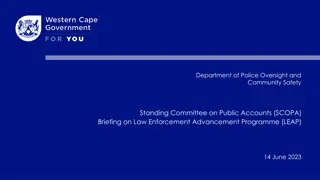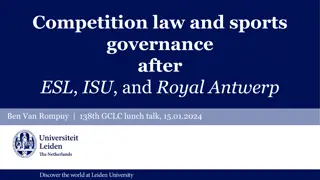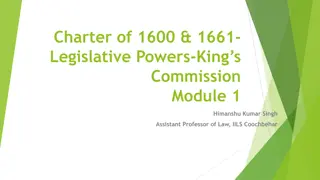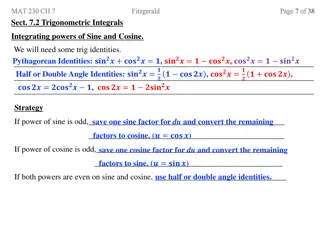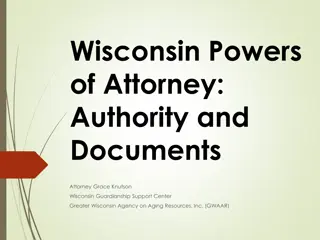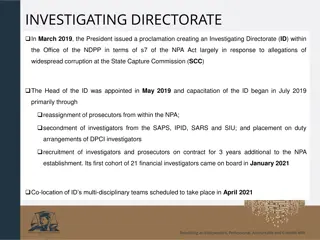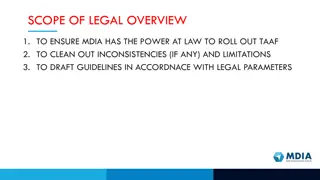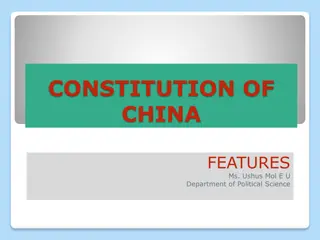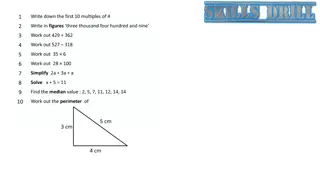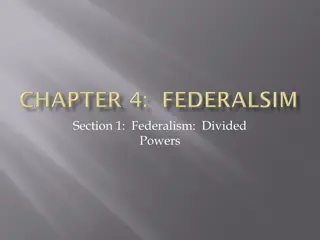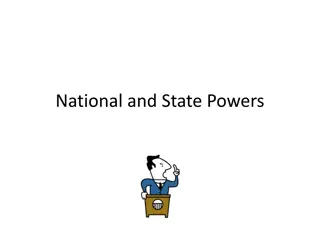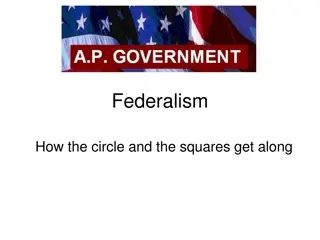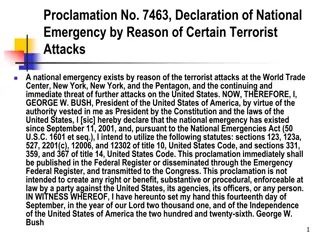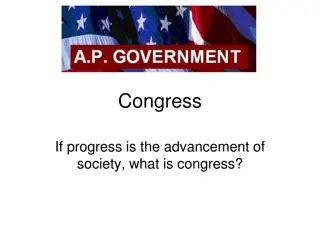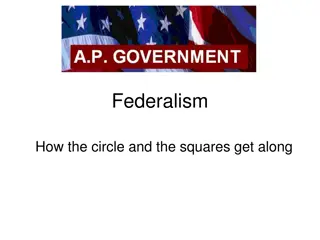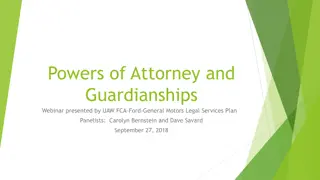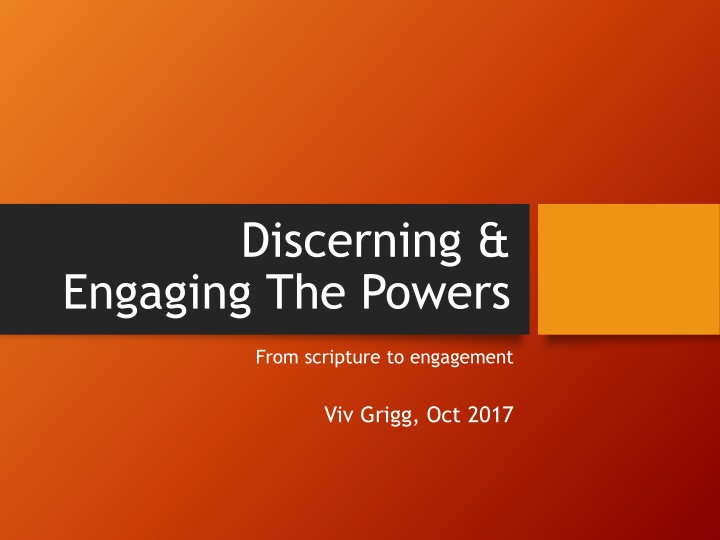
Interpreting the Powers: Insights from Scripture and History
Explore the concept of Powers from biblical, historical, and sociological perspectives. Uncover the various interpretations, ranging from God-ordained structures to demonic influences. Delve into scriptural references, societal manifestations, and theological reflections on the nature of Authorities, Rulers, and Isms.
Download Presentation

Please find below an Image/Link to download the presentation.
The content on the website is provided AS IS for your information and personal use only. It may not be sold, licensed, or shared on other websites without obtaining consent from the author. If you encounter any issues during the download, it is possible that the publisher has removed the file from their server.
You are allowed to download the files provided on this website for personal or commercial use, subject to the condition that they are used lawfully. All files are the property of their respective owners.
The content on the website is provided AS IS for your information and personal use only. It may not be sold, licensed, or shared on other websites without obtaining consent from the author.
E N D
Presentation Transcript
Discerning & Engaging The Powers From scripture to engagement Viv Grigg, Oct 2017
But this: He sustains the Universe And appoints Principalities and Powers These reign over earthly structures, cultures, institutions, religions Not this!! Fake News Discerning & Engaging The Powers From scripture to engagement Viv Grigg, Oct 2017
Biblical Theologies from Contexts of Oppression Biblical contexts of response to oppression and injustice Seeking Justice Understanding the Nature and Limits of Authority Understanding how mega-structures cultural configurations function Liberation from Oppressive Authority
Historic Theologies from Contexts of Oppression Anabaptist rejection of power, as they were oppressed by State churches. From this the Mennonites and their commitment to non-violence against the structures of domination Wink s trilogy. The evangelical German responses to Hitler Berkhof on the Powers Latin American responses of Liberation Theology - Boff Pentecostalism with a focus on Power
The Biblical Data on Principalities and Powers Deut 32:8,9 Psa 82:1-4 Dan 10:13-14 Matt 12:29 Matt 24:29 Luke 12:11 Rom 8:38-39 Rom 13:1-2a 1 Cor 2:6-8 1 Cor 15:24-26 2 Cor 10:3-4 Eph 1:20-21 Eph 2:1-2 Eph 3:10 Eph 6:12 Col 1:16-20 Col 2:10 Col 2:15 Titus 3:1 1 Pet 3;22 Rev 18-21
What are the Powers? Authorities, rulers, powers isms, Marxism, communism, Capitalism, nationalism Religions (Buddhism. Judaism, Hinduism, Catholicism), Traditions (religious and cultural) Cultures Multinationals, global economics, WTO, UN Militarisms, Nations and their armies Philosophies Higher principalities
Various Interpretations Luther: the Powers are God-ordained structures we are to submit to and obey. Sociology: The Powers are a human projection of collective human dynamics Pentecostalism: The Powers are high level demonic spirits intruding into people who control systems The Powers are the spiritual dimension of the social, cultural, economic and political structures that govern, part of God s good creation but have rebelled against God (Berkhof).
Berkhofs Description of the Powers Wink draws on Louis Berkhof, German theologian, who in turn draws on the German churches response to Naziism.
Responses to the Powers (Wink) Wink, from an anabaptist perspective, with a strong commitment ot non-violence and peacemaking wrote a theological trilogy of some import: Naming the Powers: The Language of Power in the New Testament Unmasking the Powers: The Invisible Forces that Determine Human Existence Engaging the Powers: Discernment and Resistance in a World of Domination The Powers are not that system (The Domination System) they are merely individual institutions and structures deployed under the overall aegis of the Domination System. The Dominations System is what obtains when an entire network of Powers becomes hell-bent on control. The Domination System is , so to speak, the system of the Powers, in a satanic parody of God, who might be called the System of the systems. The Domination System is thus equivalent to what the Bible so often means by the terms, world , Aeon , and flesh . (Wink, Engaging, pg. 49)
Bob Linthicum, studying under Saul Alinsky, brought community organizing theory and practice into evangelicalism as a practice for poor communities to engage power Confronting the Powers with Community Organizing e.g.Electricity, Water Garbage, Land Rights From McAlpine, reflecting on Robert Linthicum
The Dichotomy The world in the scriptures was created good. Including the structures of authority The world is also a description of the fallen powers. We are to submit to the structures God has created. We are to avoid the world, flee the world, to resist the devil, including his intrusions into structures.
Christianity in Culture Chuck Kraft as an anthropologist theologian, in Christianity in Culture, considers the structures as neutral. They are cultural configurations. In my writings, I consider that they can be developed as godly (infused by the work of his Spirit as in creation), good, following the best in humanity, neutral as simple procedures, evil (following the worst in our humanness or created by evil men), or demonic.
Confronting the Powers at Critical points In my writings, I argue that: We can engage the powers at various levels of structural development Thus in the educational system we can engage: The political decisions as to policy The politicians The educational department leadership The educational department systems The national content The local school boards The school principals The educators ANY ONE OF THESE CAN FALL ON THE SPECTURM OF GODLY, GOOD, NEUTRAL, EVIL, DEMONIZED. SOCIAL ANALYSIS TOOLS ARE NEEDED TO DISCERN WHICH STRATEGIC ANALYSIS IS NEEDED TO DISCERN HOW TO ENGAGE
Day to day relationship to authority The training ground for such encounters with authorities is in our daily engagement with the structures and authorities in which we exist n.b. this is culturally determined each culture can be analyzed in terms of cultural distance in authority relationships, patterns of decision-making etc.
Relationship to Authority Lorne Sanny, when President of the Navigators, gave a fine Biblical perspective that works for Americans and is somewhat valid cross-culturally. His themes: What is Authority? Submission to Authority Exercise of Authority Limits to the Exercise of Authority Confronting Unjust Exercise of Authority `http://www.discipleshiplibrary.com/lorne_sanny.php
References Berkhof, Hendrikus. (1953). Christ and the Powers. Scottsdale PA: Herald Press Dawson, J. (1989). Taking Our Cities for God. Lake Mary, FL: Creation House. Glasser, A., Charles van Engen, et al. (2003). God s Kingdom Extends over the Powers. Announcing the Kingdom. Grand Rapids, MI, Baker Academic. Chap 21. Grigg, V. (1995). Spiritual Warfare and the Poor in the Gateway Cities. In M. Wilson (Ed.), Praying Through the 100 Gateway Cities. Seattle: YWAM Publishing. Grigg, V. (2004) With Justice for All. In Companion to the Poor. Authentic. Grigg, V. (2009). The Spirit of Christ and the Postmodern City: Transformative Revival Among Auckland's Evangelicals and Pentecostals. Lexington, KY: Emeth Press and Auckland: Urban Leadership Foundation.
References Kraft, C. (1979). Christianity in Culture: A Study in Dynamic Biblical Theologizing in Cross-Cultural Perspective. Maryknoll: Orbis Books. Linthicum, R. (1991). City of God, City of Satan: A Biblical Theology of the Urban Church. Grand Rapids, MI: Zondervan. McAlpine, T. H. (2003). Transformed by Osmosis. In Facing the Powers. Wipf and Stock Publishers. Sanny, Lorne, (c 1976) Authority series. Navigators Wink, Walter. (1992) Engaging the Powers. Minneapolis: Fortress Press.

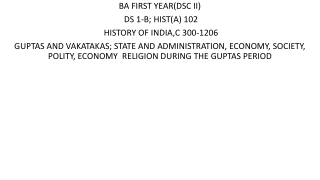
![READ⚡[PDF]✔ Emerging Space Powers: The New Space Programs of Asia, the Middle Ea](/thumb/21554/read-pdf-emerging-space-powers-the-new-space-programs-of-asia-the-middle-ea.jpg)
